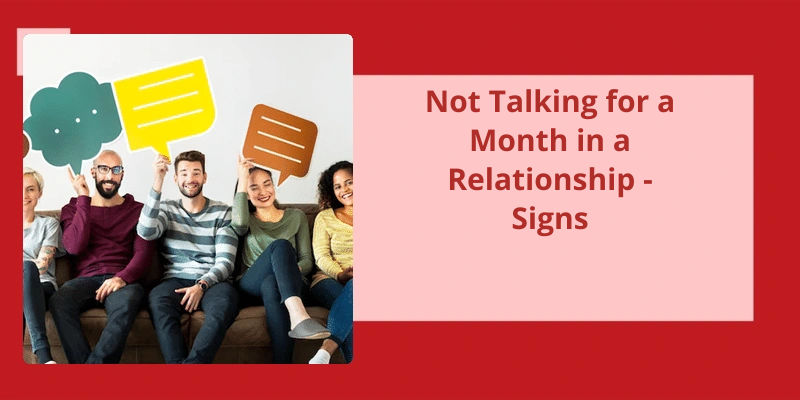However, what happens when those comfortable silences turn into a month-long absence of communication? Not talking for a month in a relationship can raise red flags and leave one wondering what went wrong. The reasons for not talking can vary from personal issues to external stressors, but the effects can be damaging to the relationship. It can build resentment, create a sense of disconnection, and even lead to a breakup. It's essential to address the lack of communication and understand each other's perspective to prevent any further damage to the relationship. In this article, we'll delve into the possible reasons for not talking for a month, the effects it can have on a relationship, and the steps to take to rebuild the connection.
Is It Healthy to Go Days Without Talking to Your Partner?
Communication is an essential component of a healthy relationship. However, the frequency of communication may vary depending on the nature of the relationship and individuals involved. Some couples may prefer constant communication while others may not feel the need to talk every day. It’s important to pay attention to your own and your partners communication habits and needs.
Going a day without speaking to your partner isn’t necessarily a cause for concern. It may simply be a result of busy schedules or a need for personal space. In fact, taking a break from constant communication can be healthy for some couples. It allows each person to have time and space for themselves, which can be beneficial for their mental and emotional well-being.
It’s also important to note that communication doesn’t have to be limited to verbal communication. Non-verbal communication such as physical touch, eye contact and body language can also convey love, care and support. Finding creative ways to communicate can keep the relationship strong, even if you don’t speak every day.
Finally, it’s worth mentioning that the quality of communication is more important than the quantity. It’s better to have meaningful, intentional conversations than to engage in trivial small talk just to meet a communication quota. It’s important to make time and space for meaningful conversations where both partners can share their thoughts, feelings and desires.
However, if it becomes a regular habit, it’s important to address any underlying communication issues.
In fact, many relationship experts believe that silence can be an effective tool in repairing a damaged relationship. However, it’s important to approach the use of silence in a relationship with caution, as it can also be misinterpreted and lead to further misunderstandings if not handled properly.
Can Silence Fix a Relationship?
When you allow silence to enter your relationship, it creates an opportunity to communicate without words. A look or a touch can sometimes express what youre feeling better than words ever could. Silence can also help you to absorb and process information, which can lead to greater understanding and emotional connection with your partner. In fact, studies have shown that couples who take silent walks together are more likely to feel connected and happy in their relationship.
For instance, the silent treatment is a form of emotional abuse that can cause immense harm to a relationship. It sends a message that one person is withdrawing their love and attention, and it can cause the other person to feel rejected and hurt. Therefore, it’s important to use silence in a constructive manner and not as a weapon against your partner.
In our fast-paced and busy world, it can be difficult to find time to just be with our partners without distractions. Taking a moment to enjoy the silence together can be a powerful way to deepen your connection and appreciation for one another.
When handled correctly, it can create opportunities for deeper communication, understanding, and emotional connection. Ultimately, the goal should always be to communicate openly and honestly with your partner, whether through words or in silence.
How to Establish Healthy Communication Patterns in a Relationship
- Listen actively
- Express your feelings clearly
- Avoid blame and criticism
- Be open to compromise
- Practice empathy
- Take responsibility for your actions
- Set boundaries
- Celebrate successes together
- Stay respectful even during disagreements
- Show appreciation and gratitude
Source: 15 Benefits of Silence in Relationships – Marriage.com
However, silence and avoidance can only exacerbate the problems in a relationship and lead to a breakdown of intimacy and trust. It’s important to understand the consequences of shutting down communication with your partner and find ways to break the cycle of avoidance to save your relationship.
What Happens When You Stop Talking to Your Partner?
But this lack of communication only leads to bigger issues down the line. The lack of intimacy causes both parties to feel isolated and alone, and each person begins to bury their feelings in order to avoid confrontation. When you stop talking to your partner, it festers resentment and distrust which can build up quickly.
Silence only leads to a disconnection between two people who used to love each other. The love that was once passionate and alive slowly fades away into a lifeless routine where two people are only coexisting. There’s no more spark or excitement, just a feeling of emptiness that’s hard to shake.
To maintain a healthy relationship, communication is essential. Even if it’s about small things, talking with your partner helps you stay connected and in tune with each other’s needs. When something is bothering you, it’s important to bring it up in a constructive way so that both parties can work through it together. The key to a successful marriage is to be open and honest with each other.
Communication is the backbone of a healthy marriage and it’s never too late to start. Even if you’ve allowed resentment to build up, you can make an effort to communicate better with your partner. True love can withstand almost anything, but it can’t thrive without open and honest communication.
The Importance of Active Listening in a Relationship
- Pay attention to the person speaking
- Make eye contact and nod your head
- Avoid interrupting or speaking over the person
- Ask questions to clarify understanding
- Reflect on what the person is saying before responding
- Show empathy and understanding
- Avoid distractions, such as phones or other devices
- Practice active listening regularly to improve communication in your relationship
Communication is a vital part of any relationship. Whether you’re in a long-term commitment or just starting out, finding a communication rhythm that works for both you and your partner can be challenging. Many people wonder: do you’ve to talk a lot in a relationship? The truth is, there’s no one-size-fits-all answer. However, there are some guidelines you can follow to ensure your communication frequency is healthy and effective. Susan Winter, a renowned relationship expert, weighs in on how to navigate this important aspect of any successful partnership.
Do You Have to Talk a Lot in a Relationship?
That means, are you both feeling fulfilled and satisfied with the amount of communication youre currently engaging in? Are you both expressing your needs and feelings effectively? If the answer is yes, then youre good to go. On the other hand, if one or both of you’re feeling neglected or overwhelmed, then it’s time to reassess your communication habits.
One thing to keep in mind is that different people have different communication needs and styles. Some people are more talkative, while others are more quiet and reserved. Some people prefer to communicate through texting or social media, while others prefer face-to-face conversations. It’s important to respect and understand each others communication preferences and find a balance that works for both of you.
It’s also important to keep in mind that communication isn’t just about talking. It’s also about listening and actively engaging with your partner. So even if youre not the most talkative person, make an effort to actively listen to your partner when theyre talking to you. Give them your full attention and show that youre interested in what they’ve to say.
Another thing to keep in mind is that communication isn’t just about the quantity of communication, but also the quality. It’s better to have a few meaningful conversations than a lot of superficial chatter. Make an effort to have deep and meaningful conversations with your partner, where you both share your thoughts and feelings on important topics.
The key to a healthy relationship isn’t about how much or how often you talk, but about how effectively you communicate with each other. If youre both able to express your needs and feelings in a way thats respectful and supportive, then youre on the right track. So don’t worry too much about how much you should talk – focus instead on building a strong and healthy communication style that works for both of you.
Tips for Effective Communication in a Relationship
- Listen actively and attentively to your partner
- Be open and honest about your feelings
- Avoid blaming or criticizing your partner
- Use “I” statements instead of “you” statements
- Take responsibility for your actions and words
- Be respectful and considerate of your partner’s perspective
- Practice active problem-solving together
- Work on building trust and intimacy
- Be willing to compromise and find mutually beneficial solutions
- Take breaks when necessary to prevent escalation of conflicts
Open and honest communication is a key ingredient in any successful relationship. Clearly expressing your thoughts and emotions, as well as being an attentive listener, can help build mutual trust, strengthen your connection, and deepen your understanding of one another. However, effective communication requires practice and patience, as many people may struggle with speaking honestly and openly about their feelings. Nonetheless, by learning how to communicate effectively, you can improve your relationship and cultivate a more satisfying and loving partnership.
Is Talking Important in a Relationship?
Compliment them when they do something you appreciate, or just let them know how you feel about them. However, it isn’t just important to communicate positive feelings- it’s equally important to communicate negative feelings in a constructive way. Resentment that’s left unaddressed can lead to serious relationship issues. If something is bothering you, try to communicate it calmly and respectfully.
Along these lines, communication needs to be respectful of our partners. Negative feelings and disagreements can be particularly difficult to communicate in a way that doesn’t come across as hurtful. Therefore, it’s recommended that couples practice “active listening”. This means paying attention when your partner is speaking and trying to understand their point of view. Rather than just waiting for your turn to speak, try to internalize what they’re saying and respond in a way that shows you understand their perspective.
Of course, being able to communicate well doesn’t guarantee that a relationship will work out. Some couples simply have different communication styles or personalities, and this can make things more challenging. In these situations, it may be helpful to seek out the advice of a couple’s therapist.
Another important aspect of talking in a relationship is setting boundaries. While it’s generally healthy to be open and honest with our partners, it’s also important to know when to say “no” and honor our own emotional needs. When we constantly put our partner’s needs before our own, it can be easy to become worn down and resentful. Therefore, it’s important to have conversations about what our boundaries are and what we need from our partner to feel fulfilled and happy.
Finally, not all communication needs to be verbal. Physical touch, for example, is a powerful way to communicate love and affection without saying anything at all. Hugging, cuddling, and holding hands can all be signaling a deep connection between partners. When words fail us, these gestures can often say more than anything we could say aloud. what matters most is that couples feel a sense of connection and understanding. By actively working at communication, this can be achieved.
How to Respectfully Communicate Negative Feelings and Disagreements
- Listen carefully to the other person’s perspective
- Avoid blaming or attacking language
- Express your own feelings and thoughts using “I” statements
- Try to find common ground and build on it
- Be open to feedback and willing to apologize if necessary
- Recognize and respect any cultural or personal differences that may be influencing the conversation
- Remember that it’s possible to disagree without being disrespectful
Conclusion
However, if a lack of communication becomes a pattern or one partner consistently ignores the other's attempts to talk, it can lead to feelings of neglect and resentment. Communication is the cornerstone of any successful relationship, and being able to express your thoughts and feelings to your loved one is crucial. It's important to check in with your partner regularly and make sure that you're both on the same page when it comes to your needs and expectations. Ultimately, whether or not you talk for a month in a relationship will depend on your individual situation and communication style. What's most important is that you feel heard and valued by your partner, and that you make a conscious effort to maintain a strong, healthy relationship.






